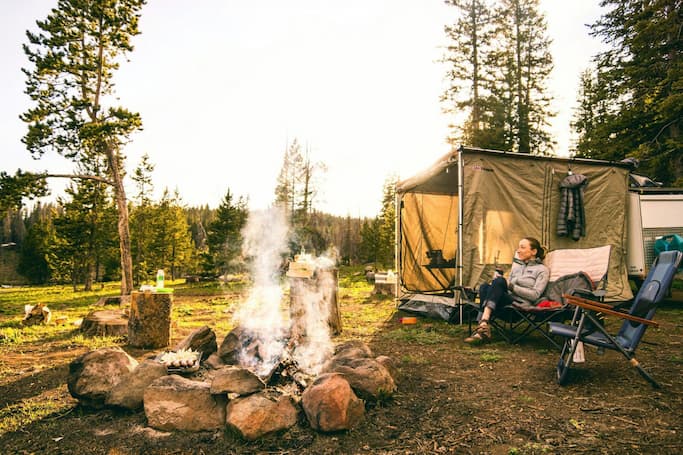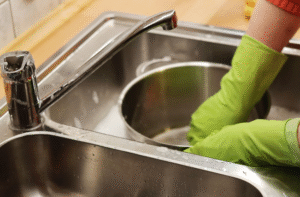My best friend Michelle and I are in the process of planning our families’ yearly camping trip. It is one of the highlights of our summer, and we can’t wait. Camping gear can be expensive- after this many years of camping we are all set with our gear. But if you’re starting out, or if you’re looking to upgrade, here are some tips on how to keep down the cost of your camping gear.

Camping brings us closer to nature and offers a break from the fast-paced routine of modern life, but getting fully equipped for the great outdoors can be surprisingly expensive. From tents to cookware to weather-ready clothing, the costs can add up fast, especially for first-time campers or families looking to explore the outdoors without breaking the bank.
One of the best long-term decisions seasoned campers make is to invest in quality rooftop tents for cars. While the upfront cost can be steep, they offer significant savings over time by eliminating the need for hotels, providing durable shelter, and lasting for years when properly maintained. But smart spending doesn’t always mean spending more—it’s about knowing where to cut corners and where to spend for value.
1. Start by Borrowing or Renting Before Buying
If you’re a novice at camping or attempting a new style of adventure, such as backcountry backpacking or auto camping, it’s a good idea to borrow equipment from a friend or rent from outdoor retailers. Most areas have local rental businesses or even peer-to-peer websites where individuals lend out gear. It’s ideal for trying out what works for you first before you commit. Why invest hundreds in a sleeping setup or portable stove that might not be the right fit?
2. Look for Off-Season Discounts and Clearance Prices
Retailers will typically stock their camping gear seasonally. During late summer and early autumn, great sales can often be found on tents, packs, and apparel as stores prepare for their winter stock. Subscribe to newsletters from outdoor stores or join outdoor equipment Facebook groups to have access to early sales, promo codes, and limited-time offers. Buying wisely can result in up to a 30–70% discount from retail prices.
3. Purchase Used but Select Wisely
Gently used gear can be just as functional as brand-new items at a fraction of the price. Online marketplaces like Facebook Marketplace, Craigslist, and specialized platforms like REI’s Used Gear shop or GearTrade are excellent places to start. However, be cautious: check for signs of wear, especially in items like sleeping bags, waterproof gear, and cooking stoves. Always ask for photos or test the gear in person when possible.
4. Pack Your Gear or Go Light
New campers tend to become mired in “nice-to-haves” checklists rather than essentials. Go minimal: a decent shelter, a working sleeping setup, and a method of cooking are generally all that’s needed to get started. Search for bundles of gear or starter sets that provide discounts on multiple items. Some companies offer family sets or adventure bundles that contain everything from tents to lights at a discounted overall price.
5. Repurpose Household Items for the Outdoors
You don’t necessarily require special camping-branded equipment. Repurpose old pots and pans, mason jars, and even yoga mats for the great outdoors. A plastic bin can be used as a waterproof food container, and retired blankets covered with foam pads can serve as a substitute for an expensive sleeping bag when camping in fair weather. Being creative with what you already have is one of the simplest ways to stay within your budget.
6. Prioritize Multi-Use Items
When you’re low on cash and space, versatility is your friend. A tarp, for instance, can be used for shelter, ground cover, or even as a backup rain fly. A multitool accomplishes what a knife, bottle opener, scissors, and pliers can in one item. In clothing, spend on layers that can satisfy both chilly nights and sunny afternoons. The more your equipment can do, the less you’ll have to carry and purchase.
7. Join Local Outdoor Clubs or Forums
Local hiking clubs and camping forums are not only social cliques—increasingly, they’re gear hotspots, swap meets, and community gatherings. Several groups have gear libraries or sponsor “gear swap” days in which members can swap or sell gear. These groups also provide good reviews and recommendations, preventing you from making wasteful purchases.
8. Consider Long-Term When It Comes to Shelter
If you’re going to camp on a regular basis or going to drive far on car road trips, your shelter must be trusted, efficient, and comfortable. That is where it is worth spending money on quality gear. Not only do they facilitate faster setup and more secure anchoring, but they also save lodging money in the long run. Think of this as an initial investment that rewards you after a few trips, particularly if you like using cars for travel.
9. DIY What You Can
DIY alternatives abound that can substitute for or complement commercial equipment. Handmade fire starters (such as dryer fluff stuffed into rolls of toilet paper), homemade utensil holders fashioned from empty pouches, or even a homemade camp shower system made from a solar bag can all save you cash and imbue your adventures with a personal touch. YouTube and outdoor websites are saturated with helpful how-tos if you feel like getting a bit creative in the workshop.
10. Monitor Expenses and Budget Ahead
Impulse purchasing is one of the most significant budget pitfalls. Make a simple spreadsheet or list of what you already own and what you still need. Budget your purchases based on future vacations or seasons, and hold to a realistic budget. That way, you’re not blowing money on an expensive cooler when a simple one will work just as well for a weekend excursion.
Spend Where It Counts, Save Where You Can
The best part about camping is that it does not have to break the bank. With careful planning, a readiness to reuse and recycle, and a clear understanding of what you actually need, you can camp safely and comfortably without depleting your wallet. It’s not about possessing the most expensive kit—it’s about maximising your experience.
Whether you’re preparing for your initial weekend in the wilderness or preparing for a road-tripping season, remember that intelligent campers understand when to invest and when to be frugal. And when it’s time to select a permanent shelter, don’t be shy about spending money on quality gear and equipment your future self (and back) will appreciate.





